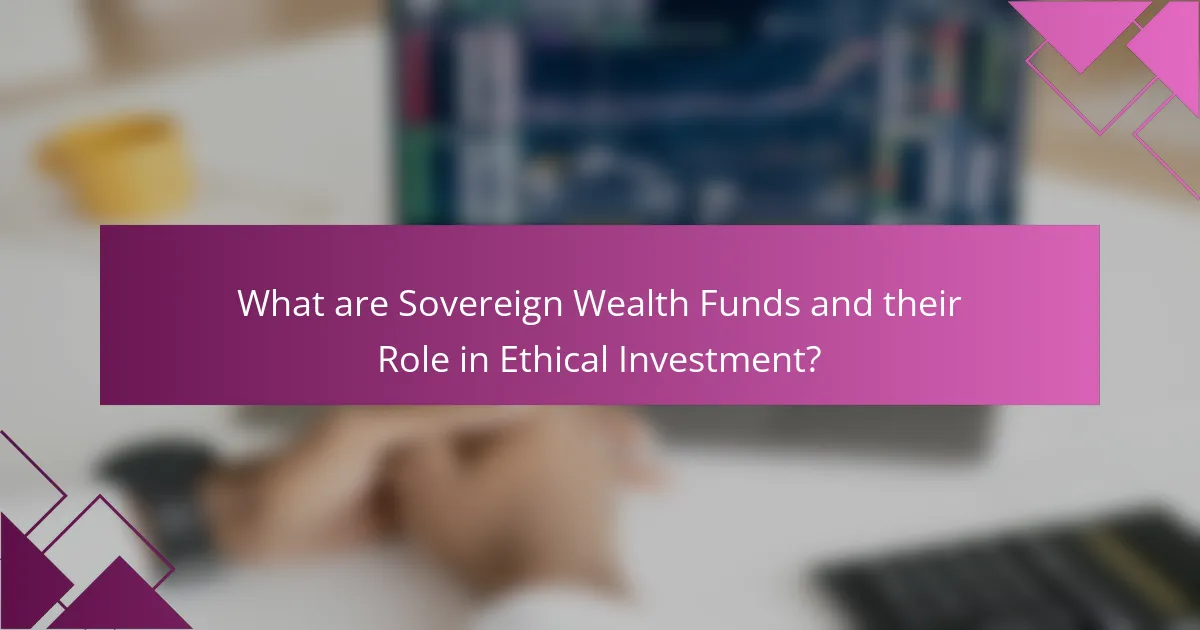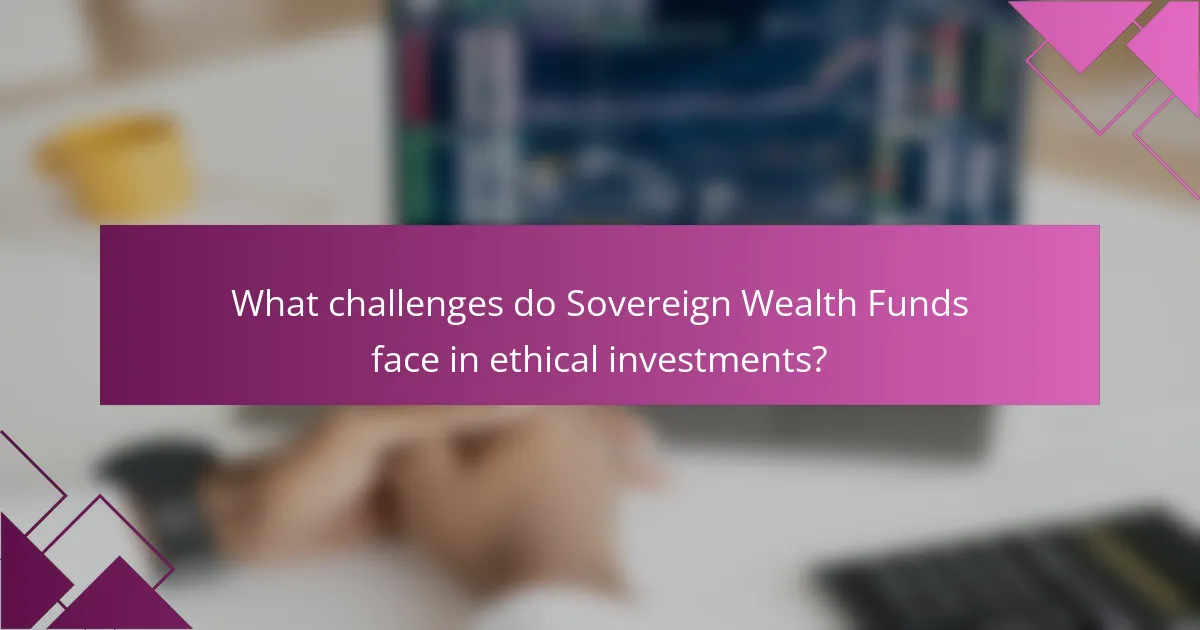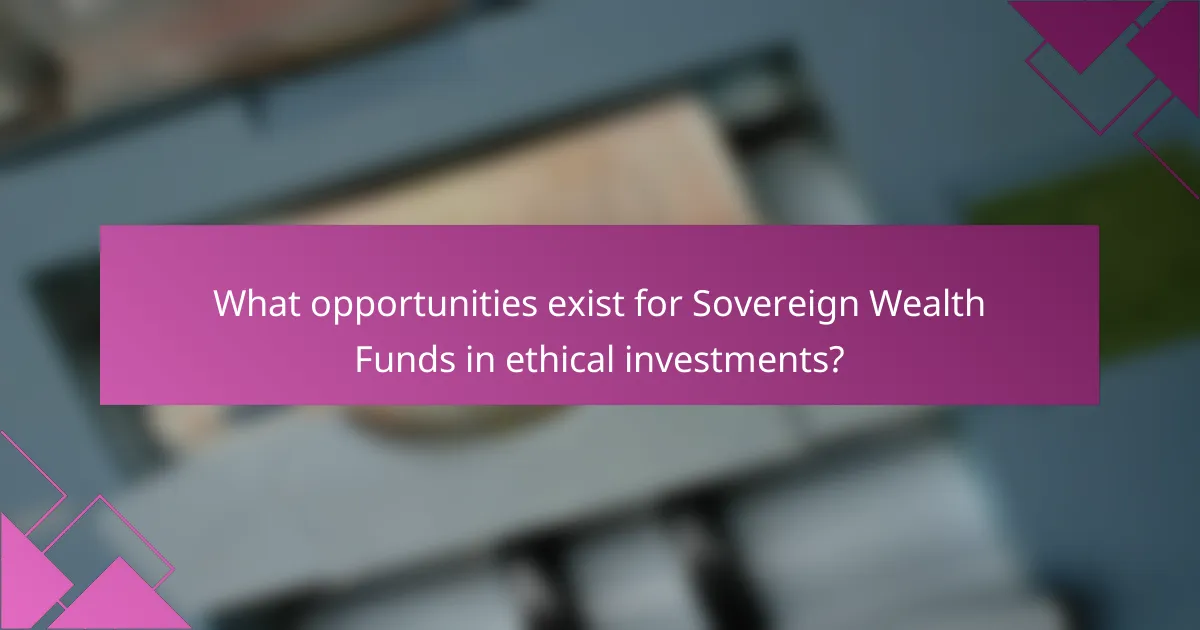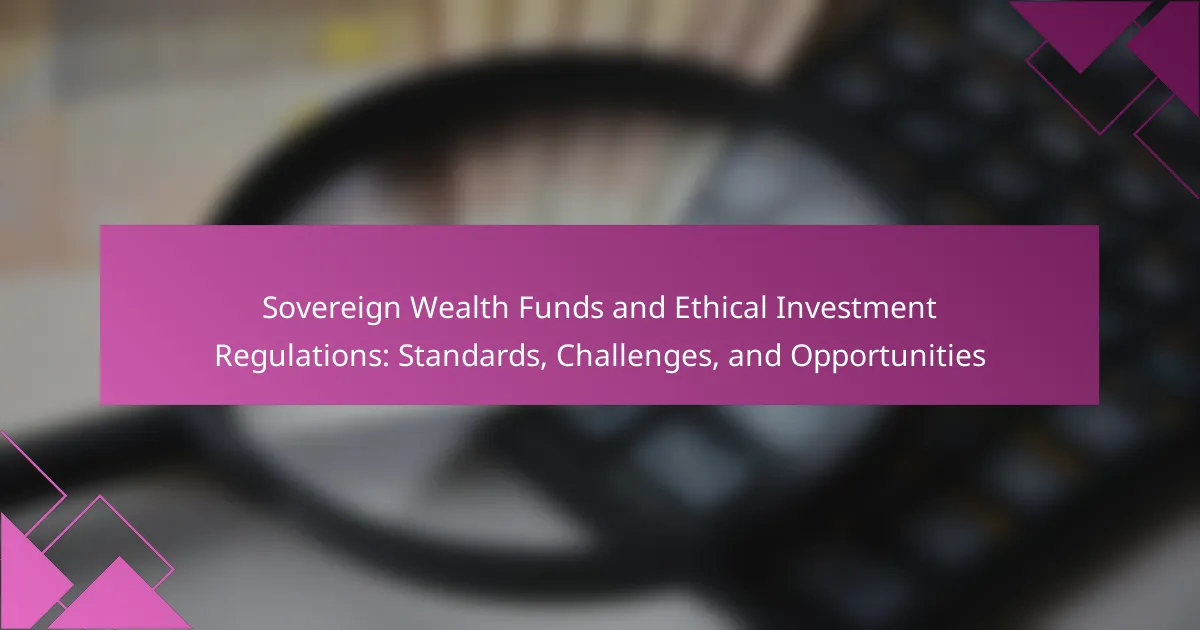
What are Sovereign Wealth Funds and their Role in Ethical Investment?
Sovereign Wealth Funds (SWFs) are state-owned investment funds or entities. They invest in various assets to generate returns for the country’s economy. SWFs play a significant role in ethical investment by integrating social, environmental, and governance (ESG) criteria into their investment strategies. Many SWFs have adopted ethical guidelines to align their investments with sustainable development goals. For instance, the Norway Government Pension Fund Global is known for its strict ethical investment policies. This fund excludes companies involved in human rights violations and environmental harm. By prioritizing ethical considerations, SWFs can influence corporate behavior and promote responsible investing globally.
How do Sovereign Wealth Funds function in the global economy?
Sovereign Wealth Funds (SWFs) are state-owned investment funds that manage national savings for various purposes. They function by investing in a diverse range of assets, including stocks, bonds, real estate, and commodities. SWFs aim to generate returns, stabilize the economy, and fund public projects. They often invest globally, influencing international markets and economies. For example, as of 2023, the total assets under management by SWFs reached approximately $10 trillion. Their investments can impact global financial stability and economic growth. Additionally, SWFs may pursue ethical investment strategies, aligning with sustainable development goals. This dual role enhances their significance in the global economy.
What are the key characteristics of Sovereign Wealth Funds?
Sovereign Wealth Funds (SWFs) are state-owned investment funds. They invest in a variety of assets, including stocks, bonds, real estate, and commodities. SWFs are typically funded by revenues from natural resources, such as oil and gas. They aim to stabilize the economy and generate long-term returns. Many SWFs also focus on diversifying national wealth. They can influence global markets due to their large capital. Transparency and governance are crucial characteristics for SWFs. Established regulations guide their ethical investment practices.
How do Sovereign Wealth Funds differ from other investment vehicles?
Sovereign Wealth Funds (SWFs) differ from other investment vehicles primarily because they are state-owned investment funds. These funds are typically financed by government revenues, such as surplus reserves from trade, and are used to invest in various asset classes. Unlike private investment funds, SWFs have a long-term investment horizon, often focusing on stability and growth for national wealth. Additionally, SWFs may have a mandate that includes economic and social objectives, which is less common in private investment vehicles. For instance, many SWFs invest in infrastructure projects to promote national development. This unique characteristic allows SWFs to operate with different risk profiles and investment strategies compared to traditional investment funds, which often prioritize short-term returns.
What ethical investment regulations apply to Sovereign Wealth Funds?
Sovereign Wealth Funds (SWFs) are subject to ethical investment regulations that vary by country. These regulations often align with international standards such as the Santiago Principles. The Santiago Principles promote transparency, accountability, and good governance in SWFs. Many countries also implement environmental, social, and governance (ESG) criteria in their investment decisions. For instance, regulations may prohibit investments in industries like tobacco or firearms. Additionally, some funds may adopt responsible investment frameworks to guide their asset allocation. These frameworks often encourage sustainable development and social responsibility. Compliance with these regulations is crucial for maintaining public trust and attracting foreign investment.
What are the main ethical standards that govern these funds?
The main ethical standards that govern sovereign wealth funds include transparency, accountability, and responsible investment practices. Transparency ensures that funds disclose their investment strategies and holdings. Accountability requires funds to adhere to governance frameworks and be answerable to stakeholders. Responsible investment practices involve considering environmental, social, and governance (ESG) factors in investment decisions. These standards help align the funds’ operations with global ethical norms. The Santiago Principles, established in 2008, outline best practices for sovereign wealth funds, emphasizing these ethical standards.
How do these regulations impact investment decisions?
Regulations impact investment decisions by shaping the criteria for asset selection. These regulations often require funds to adhere to ethical standards. Compliance with these standards can limit investment options. For example, funds may avoid industries like tobacco or fossil fuels. This restriction can lead to a narrower investment universe. Conversely, regulations can encourage investments in sustainable and socially responsible companies. Research shows that ethical investments can yield competitive returns. A study by the Global Sustainable Investment Alliance found that sustainable investments reached $30.7 trillion in 2018, indicating market demand. Thus, regulations influence both the scope and direction of investment strategies.

What challenges do Sovereign Wealth Funds face in ethical investments?
Sovereign Wealth Funds (SWFs) face several challenges in ethical investments. One major challenge is the lack of universally accepted ethical standards. Different countries and cultures have varying definitions of what constitutes ethical behavior. This discrepancy complicates investment decisions for SWFs operating globally.
Another challenge is balancing financial returns with ethical considerations. SWFs are tasked with generating returns for their stakeholders while adhering to ethical guidelines. This dual obligation can lead to conflicts in investment strategy.
Additionally, transparency issues pose significant obstacles. Many SWFs operate under strict confidentiality, making it difficult to assess their ethical practices. Lack of transparency can lead to public scrutiny and reputational risks.
Finally, political pressures can influence ethical investment decisions. SWFs may face pressure from governments to invest in certain sectors or regions, potentially conflicting with ethical standards. These challenges require careful navigation to align financial objectives with ethical commitments.
What are the common obstacles in adhering to ethical guidelines?
Common obstacles in adhering to ethical guidelines include lack of clarity, conflicting interests, and insufficient training. Ambiguity in ethical standards can lead to misinterpretation. Conflicting interests arise when financial goals outweigh ethical considerations. Insufficient training prevents individuals from understanding and applying ethical guidelines effectively. Additionally, organizational culture may prioritize profits over ethics. Pressure from stakeholders can also compromise ethical decision-making. Lastly, a lack of accountability mechanisms can hinder adherence to ethical practices.
How do political factors influence ethical investment practices?
Political factors significantly influence ethical investment practices by shaping regulations and investment frameworks. Governments establish laws that dictate what constitutes ethical behavior in investments. These regulations can promote socially responsible investing or restrict certain industries. Political stability also impacts investor confidence in ethical investments. Countries with strong governance attract more ethical investments. Conversely, political unrest may deter investment in regions perceived as high-risk. Additionally, political ideologies can affect the prioritization of environmental, social, and governance (ESG) criteria. For example, left-leaning governments may advocate for stricter ESG standards. In contrast, right-leaning governments might prioritize economic growth over ethical considerations. Overall, the political landscape plays a crucial role in defining the parameters of ethical investment practices.
What are the implications of market volatility on ethical investments?
Market volatility significantly impacts ethical investments by influencing their financial performance and risk assessment. Ethical investments often prioritize long-term sustainability over short-term gains. During periods of high volatility, these investments may experience increased price fluctuations. This can lead to greater uncertainty for investors focused on ethical standards. Additionally, market volatility can drive investors to prioritize stability over ethical considerations. Research indicates that ethical funds may outperform traditional funds in volatile markets, suggesting resilience. However, the long-term commitment to ethical principles can be tested during economic downturns. Investors may need to reassess their strategies amid changing market conditions.
How do different countries approach ethical investment regulations?
Different countries approach ethical investment regulations through varying frameworks and standards. For instance, the European Union has established strict guidelines under the Sustainable Finance Disclosure Regulation (SFDR). This regulation mandates transparency regarding sustainability risks in investment decisions. In contrast, the United States relies more on voluntary guidelines, allowing firms to adopt ESG (Environmental, Social, and Governance) criteria at their discretion. Countries like Norway enforce ethical investment through their sovereign wealth fund, requiring adherence to specific ethical standards. Japan has recently adopted the Stewardship Code, encouraging institutional investors to engage in responsible investment practices. Each of these approaches reflects the country’s regulatory environment and cultural attitudes toward ethical investing.
What are the variations in ethical standards across regions?
Ethical standards vary significantly across regions due to cultural, legal, and economic factors. In North America, for example, ethical investment often emphasizes corporate governance and social responsibility. European countries tend to prioritize sustainability and environmental impact in their ethical guidelines. In contrast, Asian regions may focus on community welfare and local development as key ethical considerations.
These differences reflect varying societal values and regulatory frameworks. For instance, Scandinavian countries have robust ethical investment practices rooted in transparency and accountability. Meanwhile, emerging markets might have less stringent ethical standards due to economic constraints.
Research indicates that these regional variations can influence the performance and perception of sovereign wealth funds. A study by the International Institute of Finance highlights that ethical investment practices can enhance long-term returns while aligning with regional values.
How do these differences affect global investment strategies?
Differences in ethical investment regulations affect global investment strategies by creating varying compliance requirements. Sovereign wealth funds must navigate these regulations based on their home country’s standards. For example, stricter regulations in one country may limit investment opportunities in sectors deemed unethical. Conversely, countries with lenient regulations may attract more foreign investment. This divergence leads to a fragmented investment landscape. Investors may prioritize countries with favorable regulations to maximize returns. Research indicates that 70% of global investors consider ethical standards in their strategies. Thus, these differences significantly influence investment decisions and portfolio management.

What opportunities exist for Sovereign Wealth Funds in ethical investments?
Sovereign Wealth Funds (SWFs) have significant opportunities in ethical investments. These funds can invest in sustainable projects that align with environmental, social, and governance (ESG) criteria. Ethical investments often lead to long-term financial returns and reduced risks. For instance, a study by the Global Sustainable Investment Alliance reported that sustainable investments outperformed traditional investments in recent years. Additionally, there is growing public demand for responsible investment practices. This trend encourages SWFs to adopt ethical investment strategies. Investing in renewable energy, sustainable agriculture, and social enterprises presents viable options for SWFs. These sectors are not only ethical but also show potential for growth. Overall, SWFs can leverage ethical investments to enhance their portfolios and contribute positively to society.
How can Sovereign Wealth Funds leverage ethical investments for growth?
Sovereign Wealth Funds can leverage ethical investments for growth by aligning their portfolios with sustainable practices. This approach attracts socially conscious investors and enhances brand reputation. Ethical investments often yield long-term financial returns. According to the Global Sustainable Investment Alliance, sustainable investment assets reached $35.3 trillion in 2020, indicating strong market demand. By investing in renewable energy and green technologies, these funds can tap into emerging markets. Additionally, ethical investments reduce risks associated with regulatory changes and reputational damage. Many studies show that companies with strong ESG (Environmental, Social, Governance) practices outperform their peers. Therefore, focusing on ethical investments can provide Sovereign Wealth Funds with both financial and societal benefits.
What sectors are emerging as leaders in ethical investment opportunities?
Renewable energy, sustainable agriculture, and technology for social impact are emerging as leaders in ethical investment opportunities. The renewable energy sector is growing rapidly due to global shifts towards sustainability. Investments in solar and wind energy have surged, reflecting increasing demand for clean energy solutions. Sustainable agriculture focuses on environmentally friendly practices, attracting investors interested in food security and climate resilience. Technology for social impact includes companies that address social issues through innovative solutions, drawing attention from impact investors. These sectors demonstrate strong growth potential while aligning with ethical investment principles.
How can collaboration enhance the effectiveness of ethical investments?
Collaboration can enhance the effectiveness of ethical investments by pooling resources and expertise. When stakeholders, including governments, NGOs, and private investors, work together, they can share best practices. This sharing leads to improved decision-making and risk assessment. Collaborative efforts also facilitate the establishment of common standards for ethical investments. For instance, joint initiatives can create frameworks that guide investment choices towards sustainability. According to the Global Sustainable Investment Alliance, collaboration has led to a 25% increase in sustainable assets globally. By uniting efforts, stakeholders can amplify their impact on social and environmental issues. This collective approach ultimately drives more significant change in investment practices.
What best practices can enhance the success of ethical investments in Sovereign Wealth Funds?
Implementing strong governance structures enhances the success of ethical investments in Sovereign Wealth Funds. Effective governance ensures transparency and accountability in investment decisions. Establishing clear ethical guidelines aligns investments with social and environmental values. Regular stakeholder engagement fosters trust and encourages diverse perspectives. Utilizing rigorous ESG (Environmental, Social, Governance) criteria aids in evaluating potential investments. Conducting thorough due diligence minimizes risks associated with unethical practices. Monitoring and reporting on investment impacts promotes ongoing commitment to ethical standards. Collaborating with ethical investment networks strengthens knowledge sharing and best practices.
How can transparency improve stakeholder trust in investment decisions?
Transparency enhances stakeholder trust in investment decisions by providing clear and accessible information. When stakeholders understand the decision-making processes, they feel more secure in their investments. Transparency reduces uncertainty and mitigates perceived risks. It fosters accountability among investment managers and organizations. Studies show that organizations with high transparency levels attract more investments. For example, the Global Reporting Initiative indicates that companies with transparent reporting have better stakeholder engagement. This engagement leads to stronger relationships and increased loyalty. Furthermore, transparent practices align with ethical investment regulations, reinforcing trust among stakeholders.
What role does stakeholder engagement play in ethical investment success?
Stakeholder engagement is crucial for ethical investment success as it fosters transparency and accountability. Engaging stakeholders helps identify social and environmental risks associated with investments. It also aligns investment strategies with community values and expectations. Research shows that companies with strong stakeholder engagement practices often experience better financial performance. For instance, a study by the Harvard Business School found that firms with high stakeholder engagement achieved 14% higher returns on equity. This engagement builds trust and enhances the reputation of investment funds. Ultimately, effective stakeholder communication leads to more sustainable and responsible investment decisions.
Sovereign Wealth Funds (SWFs) are state-owned investment entities that play a crucial role in ethical investment by integrating environmental, social, and governance (ESG) criteria into their strategies. This article explores the characteristics of SWFs, their function in the global economy, and the ethical investment regulations that govern them. It also addresses the challenges SWFs face in adhering to ethical standards, the impact of political factors, and the implications of market volatility on their investment decisions. Additionally, the article highlights emerging opportunities in ethical investments and best practices for enhancing their effectiveness, ultimately emphasizing the importance of transparency and stakeholder engagement in achieving successful ethical investment outcomes.
